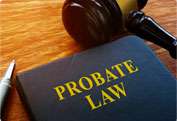Representing Individuals and Businesses
If you need experienced legal representation, let us assist you.
Will and Power of Attorney
A will is a written document that directs how you want your property distributes after your death. In your will, you appoint a trusted person to be your executor. Your executor or personal representative, through probate court supervision, is responsible for distributing your property according to the instructions you place in your will.
Before you determine to whom you want to leave your property, you need to think about the property that you have to give away. Remember that some property, such as jointly owned property with right of survivorship, will go automatically to a joint owner, even if you have a will.
A Power of Attorney (POA) is legal document in which you appoint someone else (called the Attorney in Fact) to act on your behalf on matters that you specify. A POA allows your Attorney in Fact to manage your financial affairs, either on a limited time period or on a continuing basis, should you not able to manage your affairs.
Before you become incapacitated from a sudden illness or accident, it would be best to designate someone to manage your property and financial matters.
Two types of Power of Attorney are:
- General POA: A legal document authorizing an appointed person (Attorney in Fact) to act on your behalf regarding matters that you specify except health care decisions. A General POA is not used to designate someone to make medical decisions. Some examples of the Attorney in Fact’s (an appointed person) powers are to protect and manage assets, prompt payment of existing accounts (telephone, electric, membership fees, life insurance, doctor’s bill, etc.), property management (maintenance and repair, insurance payment, etc.).
- Medical POA or Health Care POA: A legal document that allows you to appoint someone (Attorney in Fact) to make health care decisions for you in the event you are unable to and incapacitated. The person you designate to make health care decisions on your behalf is supposed to consider what you would want, so it would be best to talk with them about it. It may be a difficult conversation, but you are asking someone to take on a great responsibility for you and letting him or her know what you want will prevent any misunderstandings.
 Estate Planning
Estate Planning Revocable Irrevocable Living Trusts
Revocable Irrevocable Living Trusts Trust Settlement After Death
Trust Settlement After Death Probate Estate Settlement
Probate Estate Settlement Will POA (Power of Attorney)
Will POA (Power of Attorney) Real Property Gifting Plan Before Death
Real Property Gifting Plan Before Death Medicaid Lien Avoidance
Medicaid Lien Avoidance Conservatorship and Guardianship
Conservatorship and Guardianship Real Property Conveyance Deeds
Real Property Conveyance Deeds Reciprocal Beneficial Plan
Reciprocal Beneficial Plan